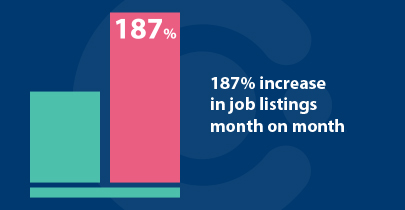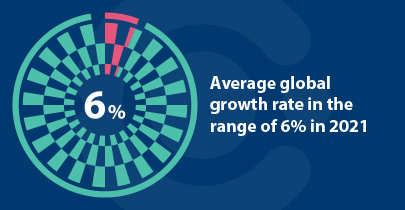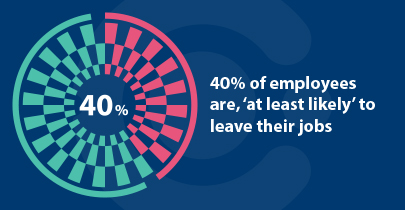
Like many European cities emerging from pandemic lockdowns, the windows of Dublin’s pubs, restaurants and shops are plastered with yellow Covid restriction reminders. And beside nearly every single one is a ‘Now Hiring’ sign.
This post-lockdown hiring surge isn’t limited to the hospitality sector. Cpl registered a 187% increase in job listings from July to August*. Demand is spiking in nearly every sector, but at the same time, 42% of workers are looking to leave their jobs in the next twelve months. What’s driving this growth in demand and the parallel drop in supply?
What is the Great Resignation?

A June report from the World Economic Forum’s Chief Economists Community shows an expected average global growth rate in the range of 5.5% to 6% for 2021 and a recovery of global GDP to pre-COVID levels within the first half of 2022. This trend has companies geared up for an explosion in post- pandemic growth.
They are expanding and hiring for new roles to meet the demand And this isn’t a short term trend, Irish government figures predict employment to surpass pre-pandemic figures by years end 2022.
However, these plans are facing their own supply chain issue, the ongoing ‘Great Resignation’. The phrase, coined by Anthony Klotz, an associate professor at Texas A&M University, refers to the massive amount of people simply leaving their jobs as we start to exit the worst of the pandemic
This Great Resignation has come as an unexpected distraction to many companies new focus on growth. Not only are expansion plans been slowed, but their ability to stay on course is being stressed. Companies who want to succeed are realising, their business goals are built on people, and ensuring your people are happy needs to come first.
Why is the Great Resignation happening now?

The reasons people are walking away from their careers, vary widely. But it’s having a huge impact, McKinsey reported that 40% of employees are, ‘at least likely’ to leave their jobs in the next three to six months. Some people are reshuffling, there’s a pent up demand for change which, in normal circumstances, would have seen them move on over the last 18 months anyhow.
In many cases, those who worked in sectors most impacted by lockdowns are re-evaluating whether they want to stay in those industries for the long term. They may have upskilled while out of work and are now looking to move on and develop their careers in other directions. A recent Irish government study suggests at many as 20,000 hospitality sector workers moved to new jobs after coming off the pandemic unemployment payment (PUP).
For some the shift to remote working has realigned their thinking about working life and they are assessing their values and commitments through a new lense. The home office has opened eyes to how wasteful commuting to work is. When the excessive costs of living in the city including, housing and childcare are added to the picture. People are questioning how they use their time and if the balance between work and family life is worth the stress involved.
Adapting to the new world of work
Regardless of the underlying reasons, the Great Resignation is dramatically impacting how we live and work and many people are questioning their commitment to employers who aren’t offering them the support they need beyond monetary rewards.
A recent McKinsey report found that, Quite a few employers are automatically turning to old reliables, “They’re bumping up pay or financial perks, like offering “thank you” bonuses without making any effort to strengthen the relational ties people have with their colleagues and their employers. The result? Rather than sensing appreciation, employees sense a transaction. This transactional relationship reminds them that their real needs aren’t being met”.
When this is coupled with the results of a survey carried out by World Economic Forum which found, ‘86% of employees felt people at their organisation are not heard fairly or equally’. We have to conclude that, the first step to alleviating the impact of the Great Resignation must to be listen to people’s needs and not simply throw money at the problem.
For example; the impact remote working has had on people, their thinking about what mattered to them, and their interests going forward has been phenomenal. Remote working and work life balance had emerged as top contract themes, whereas historically, automatically turning to compensation and monetary rewards would have been the solution to recruitment and retention issues. This is a huge shift in people’s attitude to how and where they work.
We saw this ourselves in Cpl’s recent Remote Working Report, with 44% of 1,354 respondents citing that their priorities have shifted towards a better work-life balance and an option to work remotely
Employers who listen to their people and adapt employee value propositions, to include new ways of working and flexible solutions, will come out of the pandemic is a much stronger position than companies who continue to stick to traditional ways of working.
While it has been proven that people can be productive in their homes or elsewhere. It’s not as cut and dry as having everyone simply work at home. Many people want to get back to the office and their needs must be considered too. Work needs to be tailored to individual and company needs. Whether that’s a work from home model or a hybrid one will need to be negotiated and probably on a more granular level than having a single one size fits all solution companywide policy.
Employees cut off from their preferred work environment will walk away from companies which don’t suit their needs. And employers are going to be faced with huge attrition if they don't adapt to these new expectation and employee needs.
Which sectors are going to be most impacted?
Sectors with the largest volumes of opportunities are being disproportionately affected including, Tech, Pharma, Fintech, Financial Services and Healthcare. And all levels of employers, from start-ups to multinationals are feeling the pinch as the supply of talent can't currently meet the demands for these rapid growth sectors.
For example, the Technology sector has a very particular issue adding to the issue. Cpl’s Director of Technology recruitment, Robin Craig highlights that, “There has been a Great Resignation or flow of tech talent out of the country over the past 18 months. Many Multinationals allowed employees to work from anywhere. For large numbers this meant overseas (across Europe and further afield). Now their companies are requesting staff to return to Ireland and many are resigning and looking for fully remote work from their new base.”
However, it’s happening across all sectors in some shape or form. It’s a natural shift, it previously occurred as the market emerged from the last recession a decade ago. Employees are being approached and headhunted, new opportunities are becoming available and new ways of working are being explored, all of these factors are contributing to the change we are seeing.
The boomerang effect
The Great Resignation may have HR and hiring managers stress about how to recruit and retain people for the moment. But Anthony Klutz, who coined the phrase, isn’t so worried. Klotz believes that the wave of boomerang employees will last for the next five years. After which people will start looking to return to the work force. “There’s a lot of employees quitting their jobs because they want to explore other areas of their life, other professions, whatever it may be, who knows how they'll feel in two years.”
And as companies adapt their models to meet employee needs, the reasons people left in the first place will no longer exist. While this is of little solace for the moment, it suggests, companies which adapt faster will have their pick of top qualified talent when the Great Acquisition begins.
Interested in understanding how your company can attract and retain high quality staff? Contact Cpl’s Future of Work Institute.
Sources:
Workhuman, 'Introducing the New Workhuman Survey Report: The Great Resignation', September 4th, 2021
World Economic Forum, 'Chief Economists Outlook', June 2021
The Irish Times, 'Government forecasts employment to surge past pre-pandemic levels in 2022', October 12th, 2021
McKinsey & Company, '‘Great Attrition’ or ‘Great Attraction’? The choice is yours', September 8th, 2021
Business Post, 'Study finds 20,000 hospitality workers have moved to new jobs outside the sector', October 17th 2021
McKinsey & Company, 'Your organization is grieving—here’s how you can help', September 17th 2020
World Economic Forum, 'Why listening to employees supports a positive return to work', July 7th 2021
Harvard Business Review, 'The Future of Flexibility at Work', September 28th, 2021
Cpl, 'Future Working Report: How to Win & Keep Talent in a Remote Working World', April 7th, 2021
*Cpl, Internal data, 1st July 2021- 31st August 2021
